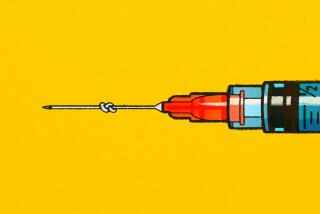Apres-Scalpel Care : New Plastic Surgery ‘Halfway Houses’ And Other Specialized Aftercare
- Share via
A NEW MINI industry is developing as an adjunct to the burgeoning field of plastic surgery. Aftercare for patients recuperating from cosmetic surgery is being touted as an important phase of the surgical experience.
Recuperative retreats and massage treatments plus camouflage cosmetics (to cover post-operative bruising) and makeup lessons for “new” faces are all being offered to people who have undergone plastic surgery. Although few doctors claim that these ancillary services are necessary, many recommend them as a way to hurry the healing process and to make the recovery period a little more pleasant.
Many cosmetic surgeons perform operations in their offices rather than in hospitals. These doctors tend to discharge patients within hours of the procedure, encouraging them to rest and recover slowly. But many patients plunge into activity too soon. To prevent this, a new form of recuperative facility is becoming a lucrative business. A few have cropped up in other parts of the country, but Southern California is the wellspring. There are at least five in the Beverly Hills area.
“Since this is the plastic surgery capital, celebrities and VIPs from all over the world come here for surgery and then need a spot to recuperate that is close to their surgeon,” explains Pam Robart, who operates Entretemps, a recuperative facility affiliated with Midway Hospital in Los Angeles. “We’ve had people from out of town stay as long as 20 days.” At most of these spots, however, a one- or two-night stay is typical.
Usually staffed by registered nurses who specialize in post-operative care, these plastic surgery “halfway houses” provide round-the-clock medical care with amenities similar to those of a resort hotel.
“One of the reasons doctors want their patients to come to aftercare is that they have had serious surgery and they need a qualified nurse available for the first 24 hours to spot any potential problems,” says Nola Rocco, co-director of the Hidden Garden in Beverly Hills, an independent plastic surgery aftercare “nursing home,” as Rocco calls it. “Another reason is that, psychologically, post-op patients need to be around people who will support them, pamper them and reinforce that they’re going to be OK.”
Some aftercare facilities provide gourmet meals; others have laundry and dry-cleaning services and a florist. At the Hidden Garden, there is even a room to accommodate a couple who have undergone plastic surgery together.
“More and more, you’ll see husbands and wives have surgery at the same time, then come in and recuperate together. They feel like they’re on vacation,” says Rocco, who opened the Hidden Garden in May with Sandy Gershenson, a nurse.
Cheaper than hospitals, these facilities usually charge upwards of $225 per night, which includes meals and 24-hour nursing care. Most of the services, however, are not covered by medical insurance.
As another aspect of aftercare, cosmetic surgeons themselves frequently enlist beauty consultants to work with their patients.
For example, Dr. George Sanders of Encino has installed in his office a beauty studio in which a cosmetics consultant can meet with post-op patients. Makeup expert Judith August teaches Sanders’ patients how to deal with the new face in the mirror.
August developed her Camouflage makeup system specifically to help face-lift and nose-reconstruction patients cover the bruising and discoloration associated with those popular procedures. When the bruising subsides, she helps patients relearn how to use conventional cosmetics.
Sanders’ patients receive makeup consultation as part of their treatment, but August also gives private makeup and color-selection lessons, charging between $75 and $100 per session. “These women are dealing with a face that looks different to them,” she says. “Getting re-educated about makeup helps them make the most of the face they’ve just paid a fortune for.”
Leslie Laine is the spa director of the Westwood Marquis Hotel. She specializes in lipo-massage, a technique that she says will speed the healing process after fat-suction surgery.
Now the most popular form of cosmetic surgery in the United States, liposuction can cause the affected areas to bruise and feel very hard. According to Laine, scar tissue may begin to build up and become noticeable to the patient about two weeks after surgery. Laine massages patients “to minimize the development of scar tissue and to help release built-up fluids.”
She recommends that the patients continue their massage program for three to six weeks after surgery.
Like cosmetic surgery, post-operative care appears to be here to stay. And, as with cosmetic surgery, the field may soon be flooded with new and often unnecessary services provided by inexperienced practitioners. Board-certified plastic surgeons caution consumers to use only those services recommended by their doctor.






